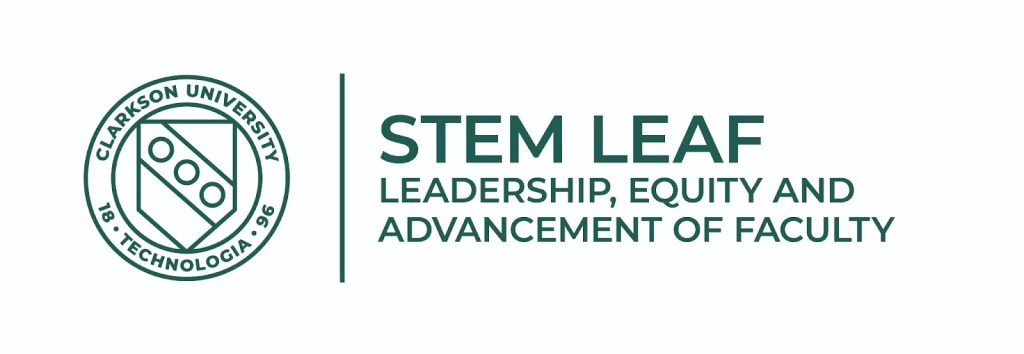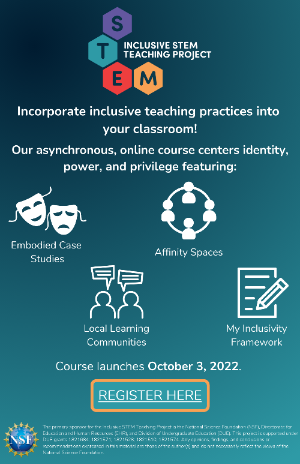
Welcome to the August edition of the STEM LEAF/ADVANCE Newsletter! In this newsletter we hope to share relevant information and resources, along with upcoming events as the fall semester approaches.
Clarkson’s NSF ADVANCE grant is designed
1) to effect positive institutional change around reduction of implicit or unintentional bias associated with gender and intersectional issues of race, ethnicity, country of origin, sexual orientation, and disability,
2) to systematically and equitably support the development of inclusive leadership skills and the professional advancement of women STEM faculty, and
3) to implement sustainable, systematic changes across the University in support of these goals.
If you have any questions or concerns, please feel free to contact us at advance@clarkson.edu.
First, the STEM LEAF/ADVANCE Team would like to congratulate Dr. Andrea Ferro on her recent NSF ADVANCE Partnership grant! We look forward to working together. More information on her award can be found here.
Inclusive STEM Teaching Project Six-Week MOOC

The Inclusive STEM Teaching Project, a NSF Improving Undergraduate STEM Education program, is hosting a six-week Massive Open Online Course (MOOC) from October 3 – November 22, 2022 via edX. Join a community of nearly 6,000 faculty, postdocs, graduate students, and staff, and learn how to:
– Advance your awareness, self-efficacy, and ability to cultivate inclusive classroom environments;
– Support your development as a reflective, inclusive practitioner;
– Engage in reflection and discussion around topics of equity and inclusion across a variety of institutional contexts;
– Implement inclusive teaching methods in your classes which will remove common barriers and enhance learning in STEM for all students.
Read more and register at: https://www.inclusivestemteaching.org/
Upcoming NCFDD Discussion Panel: “What I Wished I Would Have Known as a New Full-Time Faculty Member”
Facilitators: Teresa Gonzales, PhD, Tilicia L. Mayo-Gamble & Onawa LaBelle, PhD
Tuesday, August 20, 2022 from 2-3pm. Register Here.
Recent Resources/Opinions/News
“Equitable, Accessible, and Inclusive Teaching Practices” in NCFDD August 2022 Newsletter by Saili S. Kulkarni
“Doing the work of providing more equitable, accessible, and inclusive teaching practices doesn’t happen overnight. It requires us to unlearn some of the inequitable ways that higher education teaching has been traditionally designed.”
“Revolutionizing Promotion to Full Professor” in Inside Higher Ed by Sydney Freeman Jr. and Vicki L. Baker
“In particular, the process by which people are promoted to full professor can create problematic outcomes due to its inherent lack of clarity: there are generally no set timelines, and “going up” is often based on faculty members’ personal agency, situational factors and internal cues.”
“The Trailing Spouse” in Inside Higher Ed by Mireille Rebeiz
If colleges are interested in real diversity work, their spousal accommodation policies for dual-career academic couples should be much clearer and more supportive, argues Mireille Rebeiz.
“Gender and Graduate School: Engineering Students Confront Life after the B. Eng.” by S. Baker, P. Tancred, & S. Whitesides
“In an exploratory questionnaire study at McGill University, we examine the reasons given by top women and men engineering students for deciding whether or not to continue their studies. Women are significantly less likely than men to plan on graduate school; they encounter hurdles such as limited personalized information, difficulties in obtaining reference letters, a low level of encouragement, and the discomfort of the engineering academic environment. We conclude with seven specific recommendations designed to encourage women, in particular, and also men to pursue graduate work.”
“MULTIPLE ROLES, MULTIPLE BURDENS: THE EXPERIENCES OF FEMALE SCIENTISTS WITH CHILDREN” by M. Sallee & A. Pascale
“This qualitative case study of faculty at one research institution examined the factors that shape female scientists’ ability to balance motherhood and their careers. Using role strain as a theoretical lens, the results indicated that participants assumed a variety of roles that frequently came into conflict with one another. In particular, female scientists’ ability to balance competing demands was shaped by the nature of the academic work in the sciences, departmental colleagues, and features of home life. While on the surface policies and people supported participants who were balancing work and family, the underlying norms suggested that faculty should prioritize work over family. The article concludes with suggestions of ways institutions might create a culture that supports female scientists in balancing their work and home demands.”
If you’d like to keep up with information like this regularly, you can follow our Twitter account @ClarksonADVANCE.